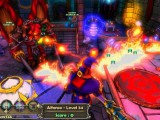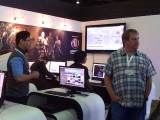 Since its inception in 2008, the Dubai World Game Expo has been the annual showcase for game developers in the Middle East. In the last few years many western studios have taken an interest and have come to sponsor or give panels, including CryTech, Blizzard Entertainment, Electronic Arts, and Epic Games.
Since its inception in 2008, the Dubai World Game Expo has been the annual showcase for game developers in the Middle East. In the last few years many western studios have taken an interest and have come to sponsor or give panels, including CryTech, Blizzard Entertainment, Electronic Arts, and Epic Games.
Epic had a large presence at DWGE 2010, showcasing their latest development tool, the Unreal Development Kit. Their booth featured a workshop with tutorials on the basics of the UDK, and representing Epic at DWGE were Jay Wilbur, Vice President, as well as Markus Arvidsson and James Tan - two of the independent developers behind UDK-based game The Ball. I sat down with these fine gentlemen to discuss a variety of topics including Unreal Engine 3, the UDK, and games development in general. What follows is my conversation with Jay.
The Slowdown: The Unreal Engine has a long history of licensing and modding; how did the decision to launch the Unreal Development Kit only come about now after all these years?
 Jay Wilbur: So, all the while, we’ve always made our games open and available for people to mod - Unreal Tournament 3, going back to the original Unreal. People would be able to use the tools to make their own mod. But that locks those creative endeavours to the game, so somebody else would need to own that particular game in order to play the mod. With the UDK, we’ve freed developers to create standalone applications, turn it into a standalone playable entity - asset, I should say, and then deliver it to anybody who wanted to play it. They wouldn’t necessarily need to own that game in order to play it. So the goal was basically to have more people use Unreal Engine 3 in the development and also have more people be able to play the end result.
Jay Wilbur: So, all the while, we’ve always made our games open and available for people to mod - Unreal Tournament 3, going back to the original Unreal. People would be able to use the tools to make their own mod. But that locks those creative endeavours to the game, so somebody else would need to own that particular game in order to play the mod. With the UDK, we’ve freed developers to create standalone applications, turn it into a standalone playable entity - asset, I should say, and then deliver it to anybody who wanted to play it. They wouldn’t necessarily need to own that game in order to play it. So the goal was basically to have more people use Unreal Engine 3 in the development and also have more people be able to play the end result.
Epic has been very regular with its revisions of the UDK, with updates almost every month. What is the process of updating and releasing the new revisions?
Our development team has a roadmap that they’re working towards, and they have several high-priorty features, some medium-priority features and some low-priority features. While we do listen to the feedback that we get, most of the time that same feedback echoes our internal priority list.
Having said that, has there been feedback or requests that you have addressed specifically?
There are times when we get that kind of feedback and it makes sense for us to reconsider our priorities, yes.
 The November beta of the UDK basically marks a one-year anniversary for the dev kit1 - you showcased some of the new additions to the engine in a tech demo video.
The November beta of the UDK basically marks a one-year anniversary for the dev kit1 - you showcased some of the new additions to the engine in a tech demo video.
It just happened to work out in that time-frame, the development team didn’t work just to make sure [the features in the trailer] were in this release, they just happened to be in the ‘birthday release’.
As of right now, the tools are still labeled as in the ‘beta’ phase. When do you plan to bring it out of beta?
Eventually, yes, it will be out of beta, and the engineering team will tell me when that happens.
There are quite a number of middleware solutions out there such as CryEngine and iD Tech, how does Epic plan to stay ahead of the curve?
We offer the best tools in the business, we have very flexible licensing terms, as far as the product goes, you’ll find none better in the marketplace - UE3 is as premium as it gets. We continue to provide excellent support, we continue to supply the kind of new features our developers are looking for - for example, we’ll be releasing support for iOS and we also have shown off support for Android. So UE3 scales from the very highest of the top-end PCs and consoles all the way to the handheld devices.
How did development for iOS come about? Had you already planned to support the iOS devices somewhere down the line?
It was more along the lines of, with the release of the iPhone 3GS, our engineers came and said “We can support this, these devices have now become powerful enough so that we can support this.” And they did a tech demo which proved the tech. “Scaling down” is not the right word to use, it’s now “powerful enough to support it.” And now with iPhone 4 it’s even more powerful.
 Whose idea was it to make Project Sword, Chair’s or Epic’s?
Whose idea was it to make Project Sword, Chair’s or Epic’s?
We decided that iOS was a priority for us. Chair is part of the Epic family, so we asked the folks at Chair to come up with some design proposals for a really cool iOS game. And they came up with a couple and Project Sword was the one that we all decided was the best one.
The tech demo came out of nowhere, and struck me as a very polished piece of work for a demo.
There are a couple of things working towards that. One, they’re using UE3, which allows for rapid iteration of super high-quality products, which is another reason why UE3 is always the dominant engine in the marketplace. Two, the guys at Chair are just great, they’re geniuses - Shadow Complex was just genius.
How independent is Chair in the development of their projects? Do they come up with their own ideas for games or are they directed by Epic?
They’re part of the Epic family, so everybody is walking in the same direction, but they’re independent enough, so they come up with their own designs. We didn’t say “make a sword game,” we said, “tell us what kind of game you’d like to make.” They spent their time coming up with various game ideas, from which Infinity Blade was the one that was selected.
Are there other commercial projects in the works for iOS, by Epic or any other studio?
We are working on UDK for iOS so that people developing for UDK can port their games to iOS. We’ve licensed UE3 to several development groups who are making iOS games, none of which I am at liberty to discuss.
How does porting work? Can developers who already have a PC build of their game made with UDK easily port it over to iOS?
They can use that as the starting point. Whether it will port well to iOS really depends on a number of different factors. In particular, depending on the control schemes, so if you’re going to use a tilt control mechanism, or multitouch or tap to control. If you’re using a lot of physics, or doing a lot of advanced lighting effects that a PC with a high-end video card would be able to handle, you may have to scale some of those back on the iPhone, just to take advantage of what that platform has to offer. But if you do have a game on UDK for the PC and you want to bring it to iOS, you have a great starting point.
How do you think developers will approach the handheld platform, with regards to the different challenges posed by aspects such as the controls?
It’s up to the developers. We’ve selected a number of different input methods. With Epic Citadel we have the dual-thumbs or tap-to-go. Infinity Blade uses finger motions to control the sword, and you use gestures to create magical symbols on the screen.
What do you think will be the deciding factor for gamers when it comes to touchscreen games? What makes a game competitive in the touchscreen gaming space?
That’s a good question. I think it’s going to depend on the quality of the game. In any entertainment marketplace, it’s going to be the quality of the game that predicts the sales. If the game is really really good, you know, you look at Gears of War, Unreal or Halo, those kind of games are really really good, and they sell a lot of copies.
 The iPhone is great, but I’m an Android kind of guy. [Waves around the Nexus One phone being used to record the interview] Will we ever get to play UE3 games?
The iPhone is great, but I’m an Android kind of guy. [Waves around the Nexus One phone being used to record the interview] Will we ever get to play UE3 games?
[Takes out a Galaxy S, shows Epic Citadel running on it] We’ve done some development on Android. That’s Epic Citadel running on Android - now, this is not for public release. It’s on iOS first, and then once the iOS version is released then we’ll start considering Android.
What are the challenges in developing for Android? The demo there seems to be running great.
It runs really well and really fast. One of the problems with the Android marketplace is hardware fragmentation, that’s a really big issue. The other thing is marketplace fragmentation, there are so many different appstores out there. The Android marketplace is a little more difficult [to develop for] because there is less control. I think the Android marketplace is robust … I find it very easy to buy things on it, it’s just that Apple has very tight control. So anything in the Apple world is perfect. It’s just perfect. We like that, we like that a lot. We know that it’s just gonna work. Sometimes that’s not always the case in the Android marketplace.
Google are continuously updating the Android platform, particularly now the OS is on the cusp of a major update; are you waiting on any particular change on their end?
No, right now all our development activity is focused on iOS, it has nothing to do with anyone else.
 How did your relationship with Teotl Studios come about and how did The Ball come to be a showcase title for the UDK?
How did your relationship with Teotl Studios come about and how did The Ball come to be a showcase title for the UDK?
They developed their application and we became aware of it just because we watch the marketplace. We see who’s developing stuff. We actually have one of our support guys in the office just every once a week look over the internet and see what cool new stuff is out there and he sends us a little note and says “hey, this is a cool new thing.” And when something is really cool we reach out and say “hey, we want to put you in our showcase, we want to show your stuff off.” And the Ball was one of the applications we showed off. They were born from the Make Something Unreal contest and they did very well. We have haven’t set plans but we’d like to eventually probably look at doing another contest like that with the UDK. That’s how developers get noticed. The best way for a developer to get noticed using the UDK is to make something really cool, and release it!
The UDK’s licensing model seems to be more affordable for independent developers2. How did you decide on that model?
We sat down and thought, what’s a good, fair and equitable set of terms for what we’re offering? What is the right model for the UDK developer? I think we settled on the right model.
 What have you seen here at the Dubai Games Expo? What do you think of the local gaming development scene?
What have you seen here at the Dubai Games Expo? What do you think of the local gaming development scene?
I’ve been traveling to Dubai since the beginning of the Dubai Games Expo. I see a vibrant, a very interesting yet under-serviced marketplace - under-serviced by Western game developers. I see a wealth of talent and a wealth of consumers with nobody connecting them. My goal here is not necessarily to sell games, it’s not necessarily to sell engines - though don’t get me wrong, I want to sell engines. My primary goal is to teach the talent how to create games so that they can create companies and build wealth of their own then eventually we can come back and sell licenses to them. I think right now the ecosystem needs development and my goal is help build that ecosystem. I’ve been over for the last three years when the show started and I’ll be back next year.
 What are Epic’s plans for PC gaming? The Gears of War series seems to be very much focused on the consoles.
What are Epic’s plans for PC gaming? The Gears of War series seems to be very much focused on the consoles.
Bulletstorm will ship to the PC. Gears of War is published by Microsoft, so the direction that we take for Gears of War is set mostly by our publisher. But Bulletstorm is scheduled to be released on the PC.
What is your relationship with People Can Fly and how did Bulletstorm come to be?
Epic and People Can Fly came together with Gears of War. PCF was that team working on Gears of War 1 on the PC. They did such a great job, so we got closer and Epic became a partner with PCF. PCF developed the Bulletstorm intellectual property, then we stepped in to help them find a publishing deal with Electronic Arts. We did all the legal and business work to make it all happen, and now that it’s in full development we help in the production. We help wherever we can. We have a full-time producer, Tanya [Jessen], who is assigned to work with PCF, and we send people over from Epic headquarters to Poland to help PCF on a regular basis. Bulletstorm is awesome, it really looks like a lot of fun. It’s like Burnout with guns.
Thank you, Jay, enjoy your stay in Dubai!
We are grateful to Jay for his time, as well as to Dana Cowley and Sarah Asby at Epic for arranging our meeting. Stay tuned for the next part in this series of interviews, in which I talk to James and Markus about developing The Ball and go into further detail about the independent development scene.






Good interview. It’s a shame epic are concentrating so much on iOS but it’s interesting now they have been entering the mobile market.